Are bone broth and collagen soup as healthy and nutritious for you as you think?
They are comforting and delicious to have. But are these soups okay to count on for weight loss, better skin and health? CNA Lifestyle spoke to dietitians for the answers.
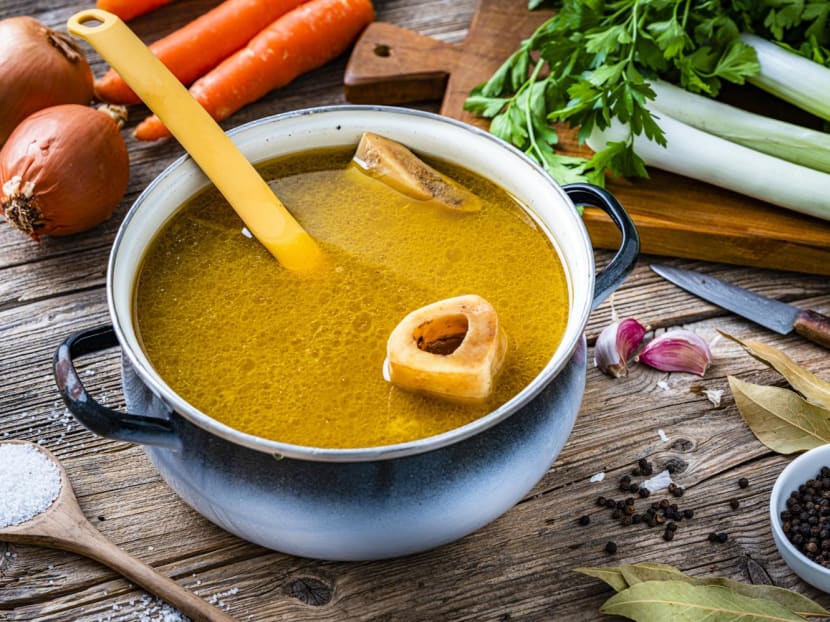
(Photo: iStock/fcafotodigital)
Bone broth is having a moment, thanks to actress Gwyneth Paltrow's recent revelation on a podcast that coffee and soup are basically what she has after coming out of intermittent fasting each day.
"I really like soup for lunch," the 50-year-old actress said on the podcast. "I have bone broth for lunch a lot of the days." To keep her inflammation level down, Paltrow said she eats a paleo dinner with "lots of vegetables"... "to support my detox".
Yes, it is not a lot of food for the average woman, which is what landed the actress in hot soup in the eyes of netizens who took issue with her impossibly low-caloric diet.
As for bone broth, Paltrow isn't the first to extol its virtues – fact or cap, we'll get to that in a bit. Pre-pandemic days and even as far back as 2015, the likes of Shailene Woodley and Salma Hayek were already cooking up crockpots of umami-rich bone broth for its purported abilities to help with just about everything, from leaky gut syndrome to attaining youthful-looking skin.
For others like Kylie Jenner and Mindy Kaling, it's bone broth, not coffee, that they're having to kick off their day.
You might be wondering: What in the world is in these women’s pots? Haven't we been having soup – be it bak kut teh, ABC soup, sliced fish soup, sup kambing or our mother’s homemade chicken soup – all our lives? What's the difference?
Jennifer Shim, a senior dietitian from Parkway East Hospital, qualifies bone broth as a liquid made with bones simmered in water for 12 to 48 hours. Stock, on the other hand, is made by boiling bones – along with vegetables – for four to six hours. Broth (usually made with meaty bones), she said, is made in an even shorter period: Just 30 minutes to two hours.
Technically, bak kut teh, sup kambing, sliced fish soup and the other soup varieties we find in Singapore are all versions of bone broth, said Gladys Wong, a senior principal dietitian from Khoo Teck Puat Hospital, as they’re all made from boiling different animal carcasses, along with the knuckles, trotters and hooves in many instances.
IS BONE BROTH REALLY NUTRITIOUS?
Whether it is broth, stock or soup to you, the resulting liquid made with bones will contain, to some degree, collagen, vitamins and minerals, said Jaclyn Reutens, a dietitian from Aptima Nutrition & Sports Consultants.
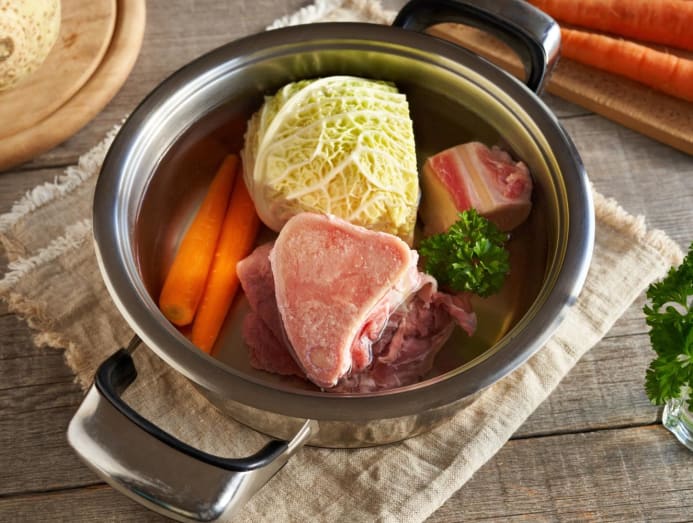
But as for how much of these nutrients are in your soup, there is not much nutritional information beyond that, she said. Take nutrients such as Vitamin C, magnesium, zinc and calcium, for example. Yes, they are present but in insignificant amounts. “You are better off eating meat and drinking milk,” said Reutens.
Wong explained that it is difficult to provide a nutritional breakdown as it depends on what bones are used. “Some bone joints may have marrow and connective tissues such as tendons and ligaments. Therefore, it is difficult to ascertain the types of vitamins or minerals in particular broths,” she said.
“In general, most bone broths should contain minerals such as calcium, phosphorus, potassium and magnesium because those are the main components of bones,” said Wong. “Some may also contain iron leached from the bone marrow or amino acids from the breakdown of the connective tissues.”
Shim also said that it is difficult to provide bone broth’s specific nutritional values as it depends on the recipe. But she agreed with Wong that these broths usually have bone-strengthening minerals such as magnesium, potassium and phosphorus.
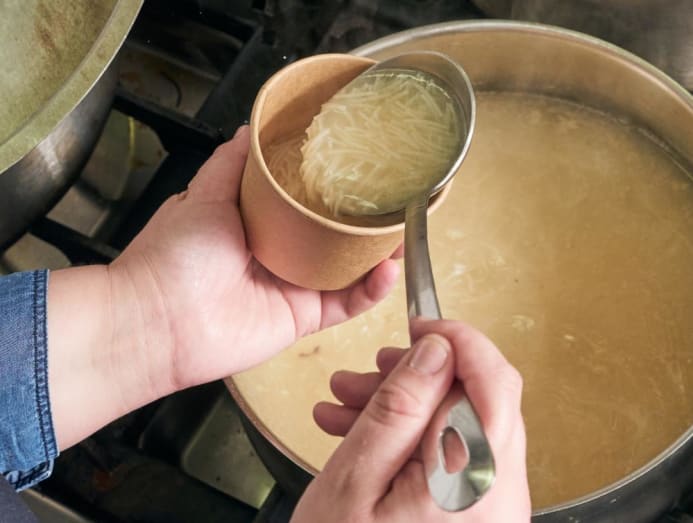
Along with the good stuff come the bad ones, too. If you’re eating out or buying those ready-made broths in the supermarket, they tend to contain a lot of sodium and fat, said Reutens. “Seasonings or flavour enhancers are frequently added, so the sodium level goes up,” she said. “After eating bak kut teh or tonkotsu ramen, do you recall feeling thirsty afterwards?”
DOES A LONGER BOILING TIME GIVE YOU BETTER BONE BROTH?
Not necessarily, said Reutens. “One anecdotal evidence found that the nutrient level of broths simmered for 12 hours was less than the broth simmered for eight hours. So it’s not a matter of the longer, the better,” she said.
Wong is not aware of any reported scientific research regarding the relationship between boiling periods and nutritional benefits. However, “prolonged cooking may affect the flavours of the broth, depending on what other ingredients, spices or herbs have been added. It’s all about personal preference”, she said.
If you’re trying to maximise the broth’s mineral content, add acids such as wine vinegar or apple cider vinegar to leach the minerals from the animal bones or marrow. “That is why the traditional black vinegar pork trotter advocated for confinement mothers is a high-calcium dish to promote breast milk production,” said Wong.
Another tip to get the most out of your bone broth is to add vegetables at the end of the cooking process, said Shim. This is to avoid getting the soup bitter and also to increase its nutrient profile.
WHAT ABOUT COLLAGEN SOUP?
Yes, what about those complexion-boosting collagen soups that you see in the supermarket as well as hotpot and ramen restaurants? “Collagen is a protein that is found in animal bones, skin and connective tissues,” said Reutens. “When collagen is cooked, another protein called gelatin is produced and that adds to the protein value in the broth.”
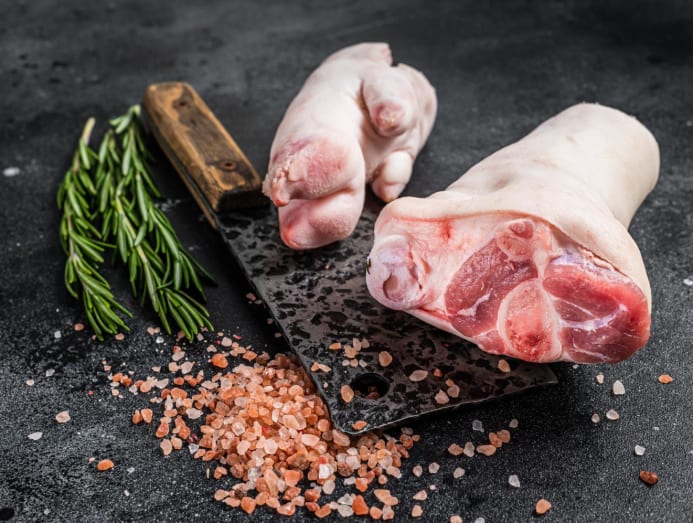
But here’s the thing: Even with all that simmering, you won’t get a lot of collagen and protein in your pot of soup. “The amount of collagen would not amount to anything more than 5g to 7g, which is the amount found in an egg or a quarter of a chicken breast,” said Reutens. “In some broths, it can be less than 1g.”
CAN OUR SKIN REALLY BENEFIT FROM THE COLLAGEN IN SOUP AND HOTPOT?
All the dietitians that CNA Lifestyle spoke to said that it is a myth that the collagen in food (be it collagen soup or supplements) will be absorbed by the body to benefit your skin.
“In food, collagen is found in meat and fish that contain connective tissues,” said Shim. “However, when eaten, the collagen is broken down into amino acids during digestion in the stomach.”
Reutens added that your body will then reassemble these amino acids to form various proteins that your body needs. “It is uncertain that the collagen you consume will eventually end up on your cheeks,” she said.
Shim continued: “Even though there are studies and trials that suggest collagen supplements can improve skin elasticity, improve joint mobility and decrease joint pain, these studies have potential conflicts of interest because most of them are funded or partially funded by related industries that could benefit from a positive study result”.
What is almost certain are the sodium and flavourings that you’ll find in these commercially produced soups, said Reutens.
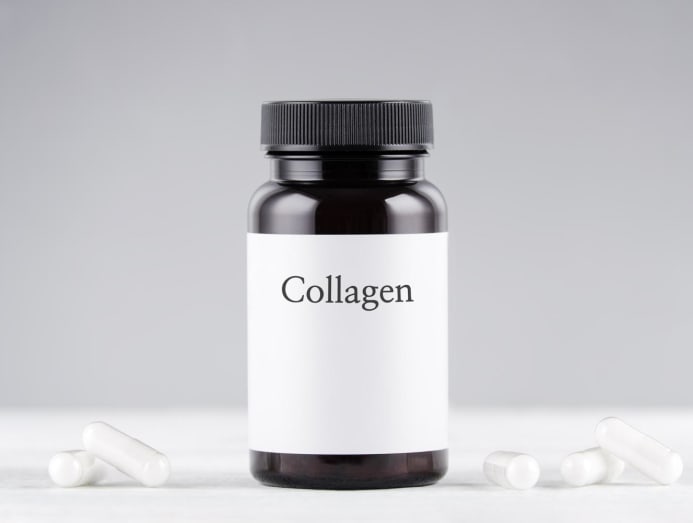
CAN BONE BROTH HELP WITH WEIGHT LOSS?
Although bone broth may appear to be mostly liquid, it may not necessarily be low in calories, said Wong. Some bone broths may be calorific if the bones used still have fatty cuts of meat. “One way to overcome this is to strain the simmered broth and leave it to cool. Thereafter, you can remove the top layer of hardened fats,” she said.
If you’re avoiding over-eating at mealtimes, bone broth can be used to fill up the stomach, said Shim. “However, it is not suitable to be used as a meal replacement as it does not contain a complete nutrient profile.”
In fact, relying on bone broth alone to lose weight can deplete you of nutrition, said Reutens. “You might experience hair fall, muscle loss and end up feeling low in energy. Bone broths can be drunk on the side but they should not be the sole source of nourishment,” she said.
Whatever you call it, broth or soup may be more nourishing for the soul than for the body.









